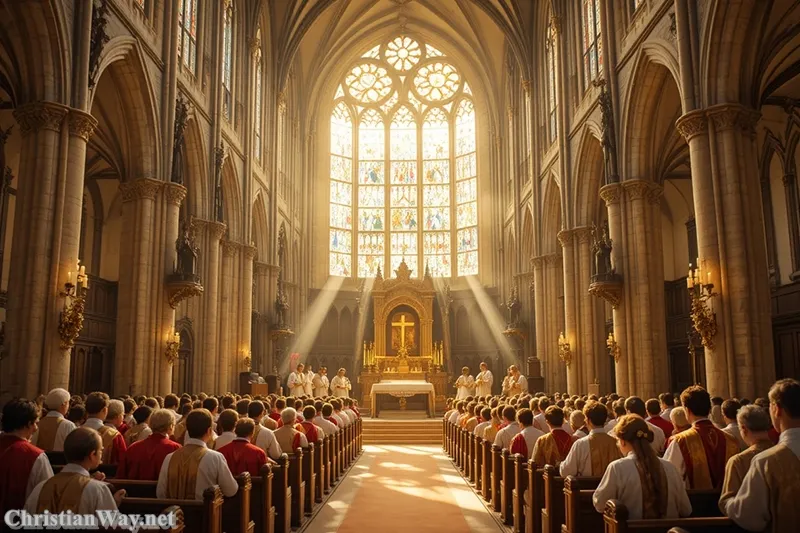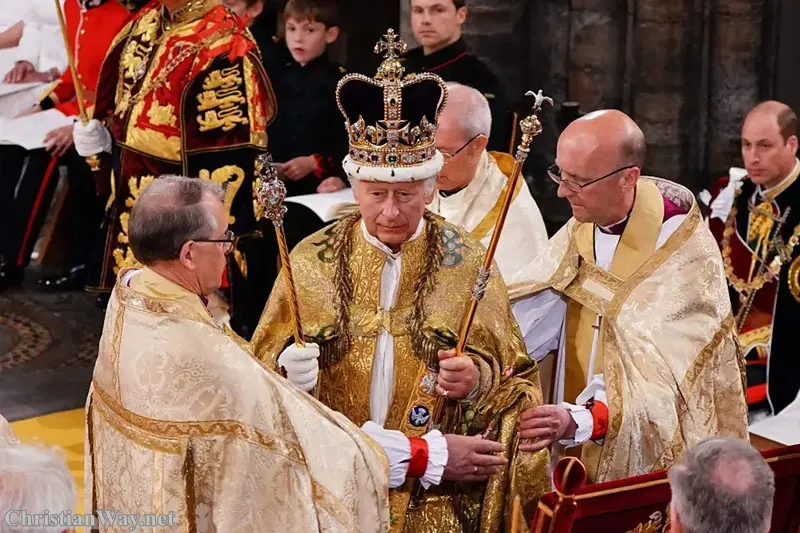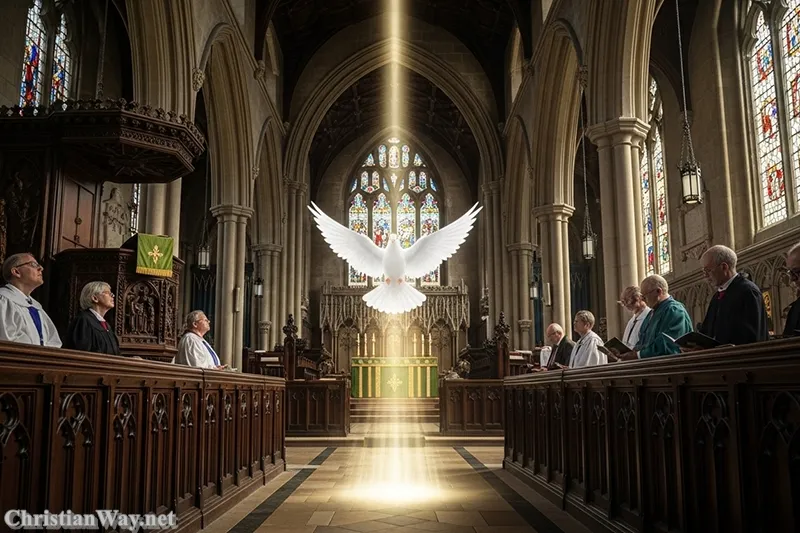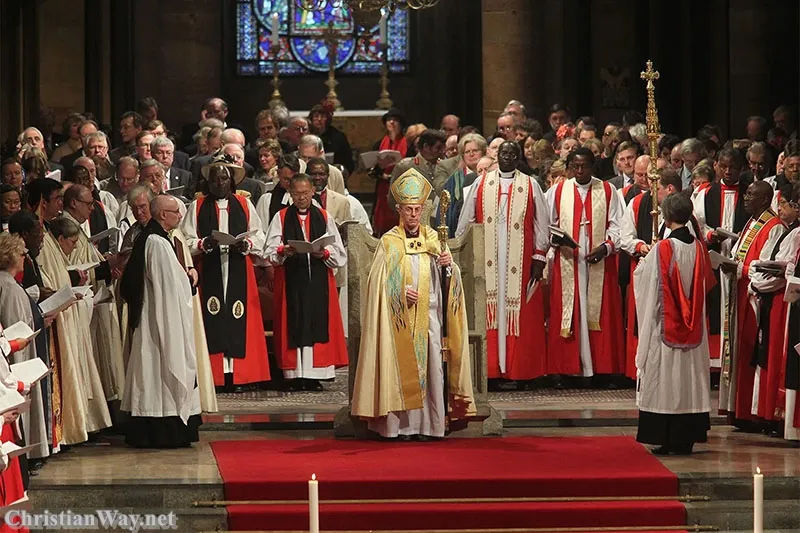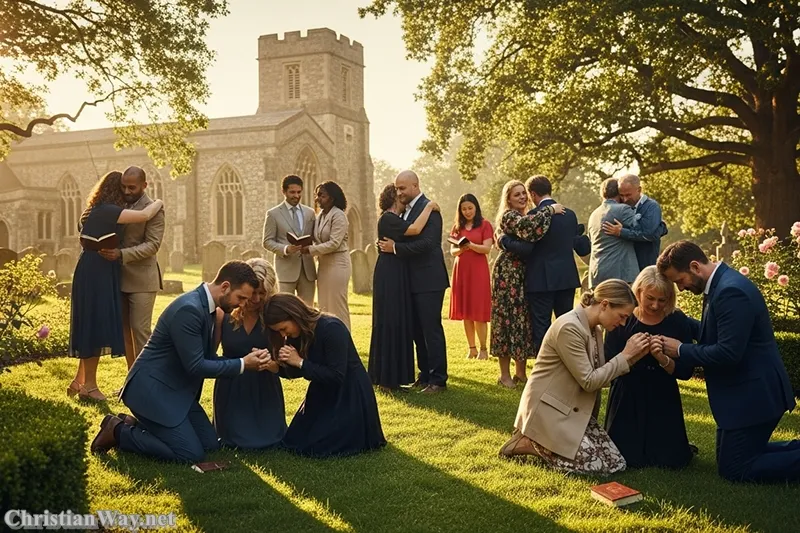Every Christian tradition carries within it a unique way of understanding and expressing the mystery of God’s revelation. For the Anglican Communion, that way is marked by a beautiful and deliberate balance — a theology that honors the authority of Scripture, the wisdom of Tradition, and the guidance of Reason. Anglican theology does not attempt to define every mystery with precision, nor does it abandon truth to the realm of personal opinion. Rather, it seeks to dwell faithfully within the tension of mystery and clarity, holding together the ancient faith of the Church and the lived experience of believers in every age.
Anglican theology was born amid the turbulence of the Reformation, when England sought to reform its faith without losing its continuity with the early Church. It stands as both catholic and reformed, cherishing the heritage of the undivided Church while embracing the call to renew and purify faith in every generation. This middle way, often called the via media, reflects not indecision, but a profound conviction that truth is best served by harmony — the kind of harmony that mirrors the unity within the Holy Trinity itself.

In this reflection, we will walk through the heart of Anglican theology — its sources, its principles, and its living spirit — to see how it invites believers to think deeply, pray reverently, and live faithfully under the light of Christ.
The Foundation: Scripture as the Living Word of God
At the heart of Anglican theology stands the Holy Scripture, which is regarded as the ultimate and sufficient source of revealed truth. The Thirty-Nine Articles of Religion, one of the foundational Anglican documents, states that “Holy Scripture containeth all things necessary to salvation.” This is not a statement of limitation, but of liberation: everything essential to our salvation and sanctification is given to us through the Word of God.
Anglicans approach Scripture not as a static text, but as the living voice of God that speaks across time. It is the Word made written, which points us always to the Word made flesh — Jesus Christ. Therefore, reading the Bible is not merely an act of study but an act of encounter. Through the Holy Spirit, the same Word that spoke creation into being continues to shape and renew the hearts of believers.
In the Anglican tradition, Scripture is read within the Church, in the rhythm of daily prayer and the seasons of the liturgical year. The lectionary ensures that the faithful are nourished by the full breadth of the biblical witness — Law and Prophets, Psalms and Gospels, Epistles and Revelation. Anglican theology, therefore, is a theology of the Word heard in community, not of private interpretation.
The Continuity: Tradition as the Wisdom of the Church
While Scripture remains the highest authority, Anglicans believe that Tradition provides the interpretive lens through which the Church understands the Word of God rightly. Tradition is not a mere collection of old customs or human inventions; it is the living memory of the Church — the faith once delivered to the saints, preserved and handed down through prayer, worship, and teaching.
The Anglican Church sees itself as part of the one, holy, catholic, and apostolic Church. Its theology draws deeply from the early Church Fathers, the ancient creeds, and the sacramental life that has sustained Christians since Pentecost. The Nicene and Apostles’ Creeds are recited in every Anglican Eucharist, linking worshippers across centuries and continents in one shared confession of faith.
In Anglican thought, Tradition serves as a compass, not a chain. It keeps the Church rooted in truth while allowing her to speak meaningfully in new contexts. As St. Vincent of Lérins wrote, true Catholic faith is “what has been believed everywhere, always, and by all.” Anglican theology embraces this principle, interpreting the Scriptures through the lens of the Church’s historic witness — never isolating itself from the wisdom of those who have gone before.
The Gift: Reason as the Light of Understanding
The third strand of Anglican theology — Reason — completes the triad often called the “Anglican tripod.” Reason, in this sense, is not the cold rationalism of modernity, but the God-given faculty that allows us to discern, reflect, and apply divine truth. It is a gift of creation, part of the image of God in humanity, enabling us to think, to love, and to seek the truth with integrity.
Anglican theology honors reason because it believes that faith and intellect are not enemies but allies. God invites His children to love Him “with all your heart, and with all your soul, and with all your mind” (Matthew 22:37). Reason helps us understand Scripture faithfully, to distinguish eternal truths from cultural forms, and to recognize the signs of God’s presence in creation and history.
Reason also guards the Church against superstition and fanaticism. It reminds us that the same God who reveals Himself in Scripture is the Author of all truth, whether discovered through science, philosophy, or experience. Thus, Anglican theology encourages honest inquiry, intellectual humility, and moral responsibility — virtues that lead not to pride, but to a deeper awe of God’s wisdom.
The Middle Way: Holding Truth in Tension
The Anglican way has often been called the via media — the “middle way” — not because it seeks compromise for its own sake, but because it seeks balance and wholeness. Anglican theology stands between extremes: between rigid dogmatism and loose subjectivism, between isolation and assimilation, between Rome and Geneva. It recognizes that the truth of Christ often lies in the tension between mystery and clarity, mercy and justice, faith and works.
This middle way is not a narrow path of neutrality, but a broad and gracious road that leads to unity. It allows for diversity of thought within the boundaries of the historic faith — what C.S. Lewis once called “mere Christianity.” Within Anglicanism, believers may hold differing theological emphases — evangelical, catholic, or charismatic — yet remain bound together by the common life of worship and the shared confession of Christ as Lord.
This generous orthodoxy reflects the humility of faith: a recognition that no human system can fully capture the mystery of God, and that truth is best received in reverence rather than conquered by reason alone.
The Sacramental Vision of Anglican Theology
Anglican theology is profoundly sacramental. It perceives the world itself as charged with the grandeur of God — a creation that reveals divine grace through visible signs. The two primary sacraments, Baptism and the Holy Eucharist, are regarded as essential to the life of faith, instituted by Christ Himself.
In Baptism, the believer is united with Christ, born anew into His body, the Church. In the Eucharist, the mystery deepens — Christ feeds His people with His very life, a communion of real presence that transcends human comprehension. Anglican theology avoids overly defined explanations of how this presence occurs, focusing instead on the reality of grace experienced by faith.
This sacramental worldview extends beyond the altar. Marriage, ordination, anointing, and reconciliation are all seen as occasions of grace — ways in which God’s invisible love becomes tangible in the visible world. Thus, Anglican theology invites believers to perceive all of life as sacramental: every act of kindness, every prayer, every beauty in nature as a participation in the divine presence.
The Role of Worship and Liturgy
Anglican theology finds its purest expression in worship — particularly in the Book of Common Prayer. This beloved text is not merely a collection of prayers; it is a theological vision in language and rhythm. It teaches doctrine through doxology, forming hearts through the words of prayer.
The Prayer Book unites theology and devotion, intellect and emotion. It teaches that theology is not an abstract discipline but an act of love — the soul speaking to God in thanksgiving and trust. Its structure of daily offices, psalms, and Eucharistic prayers continually draws the believer back to the heart of the Gospel: the love of God revealed in Christ Jesus our Lord.
Through liturgy, Anglican theology becomes embodied. It teaches by repetition, by beauty, by silence, and by song. It shapes believers not merely to know the faith, but to live it — to embody Christ’s grace in every word and deed.
Unity and Comprehensiveness
One of the most remarkable features of Anglican theology is its comprehensiveness — its ability to embrace diversity without dissolving unity. The Anglican Communion includes churches on every continent, speaking hundreds of languages, living in vastly different cultures, yet united in one shared faith expressed through Scripture, creeds, sacraments, and episcopal order.
This unity-in-diversity reflects the very nature of the Body of Christ. Just as the members of a body differ in function but share one life, so too do Anglicans around the world reflect varied theological emphases while remaining rooted in one faith and one baptism.
Anglican theology, therefore, is not a rigid system but a living conversation — a dialogue between the past and present, between faith and culture, between God and His people. It invites humility, charity, and patience — virtues needed for any community that seeks to remain faithful to Christ in a changing world.
Faith in the Modern World
In today’s world of doubt, division, and moral confusion, Anglican theology continues to offer a voice of balance and hope. It reminds us that faith need not fear reason, that ancient truth can speak to modern hearts, and that holiness is found not in separation from the world, but in the sanctification of ordinary life.
Anglican theologians have often stood at the intersection of faith and culture, addressing questions of ethics, science, and justice through the lens of grace. From Richard Hooker in the 16th century to N.T. Wright in our own time, Anglican thought has sought to witness to Christ as both the truth of the past and the hope of the future.
This engagement with the world is not compromise; it is incarnation. Just as Christ entered our human condition, Anglican theology calls believers to engage the questions and wounds of our age with compassion and wisdom — bringing the light of the Gospel into every sphere of human life.
Reflect and Pray
Anglican theology, at its best, is a symphony of faith, intellect, and devotion — a living witness to the truth that God’s grace can dwell in harmony with human understanding. It does not seek to dominate, but to illuminate; not to divide, but to reconcile; not to impose certainty, but to cultivate trust in the mystery of divine love.
May all who walk this Anglican path find in its balance not compromise, but peace — the peace that comes from knowing that truth is not fragile, but eternal, and that Christ Himself is the center from which all things hold together.
May the Word of God dwell richly in your heart, may the wisdom of the saints guide your steps, and may the light of reason shine upon your faith — that you may love the Lord your God with all your heart, soul, and mind.
— Fr. John Matthew, for Christian Way
